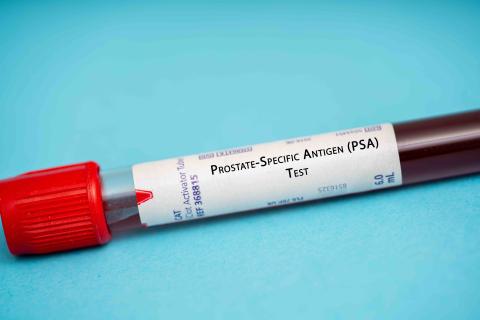Genetic testing would improve prostate cancer screening, according to a study
One of the problems with prostate cancer screening is that it results in a high rate of false positives, that is, erroneous diagnoses in people without the disease. A study in the UK has applied a genetic test to more than 6,000 people aged between 55 and 69, analysing 130 variants related to this tumour, which allows a ‘risk score’ to be calculated. According to the results, which are published in the journal NEJM, the test detected the disease more likely in people with higher values than traditional screening.

Álvaro Páez Borda - test genetico prostata EN
Álvaro Páez Borda
Head of Urology Service, Hospital Universitario de Fuenlabrada, Madrid; Associate Professor of Health Sciences, Universidad Rey Juan Carlos; and Chairman of the Spanish branch of the European Randomized Study of Screening for Prostate Cancer
This is a study led by the Institute of Cancer Research and the Royal Marsden Hospital in London and carried out in the south-east of England. The study is fully justified, since, as its authors rightly point out, there is no internationally accepted population screening programme for the early detection of prostate cancer. And why is that, if prostate cancer is a real health problem? Basically, because of the high number of false positive diagnoses, the complications of prostate biopsy and the overdiagnosis implicit in the canonical approaches to the subject. In this sense, the study is linked to other initiatives - such as the incorporation of magnetic resonance imaging (MRI) - that seek to put an end to these limitations once and for all.
The study - prospective, not randomised - was based on the genetic analysis of volunteers recruited by postal invitation; when an elevated risk of prostate cancer was detected in this test (which uses saliva), the study was completed with the determination of PSA (Prostate Specific Antigen), MRI and prostate biopsy. Prostate cancer was detected in 40% of the patients who underwent a biopsy; more than half (55.1%) of these cancers were of intermediate or high risk. And, more importantly, most of these cancers (71.8%) would not have been detected if the standard strategy in the UK had been used (PSA determination followed by MRI). This is not surprising, given that the median PSA level was 2.1 ng/ml (note that the generally accepted ‘suspicious’ PSA level is 3-4 ng/ml), a fact that once again highlights the limitations of PSA in the context of screening. However, overdiagnosis does not seem to have improved dramatically with the use of genetic analysis compared to the mere use of PSA as a screening tool.
Although the results are very promising, the low participation rate (22.2%) and the patients' withdrawals from the study completely jeopardise the chances of implementing the strategy proposed by the authors; simply put, for an early detection programme to be useful it has to be accepted by many more individuals. The authors suggest that the 2019 pandemic may have worked against the study, but the data is the data.
On the other hand, the study was carried out on a very select sector of the population (highly educated Europeans), so its performance in other types of populations with a higher underlying risk of prostate cancer would have to be seen.
In short, a well-designed and better executed study that highlights the enormous limitations of strategies based on the mere determination of PSA, but one that is not even remotely ready to be transferred to real life.
McHugh et al.
- Research article
- Peer reviewed
- People



